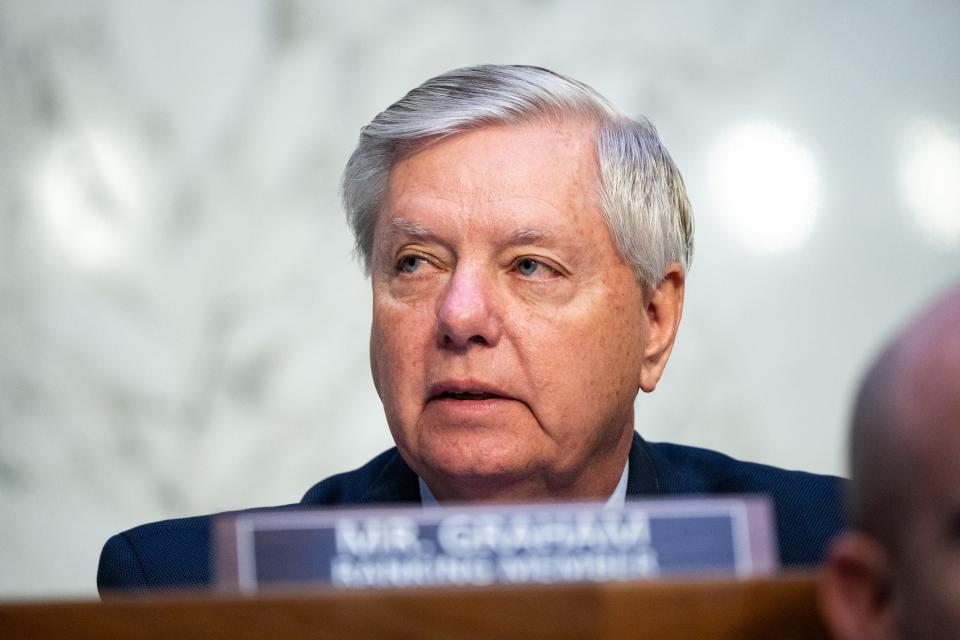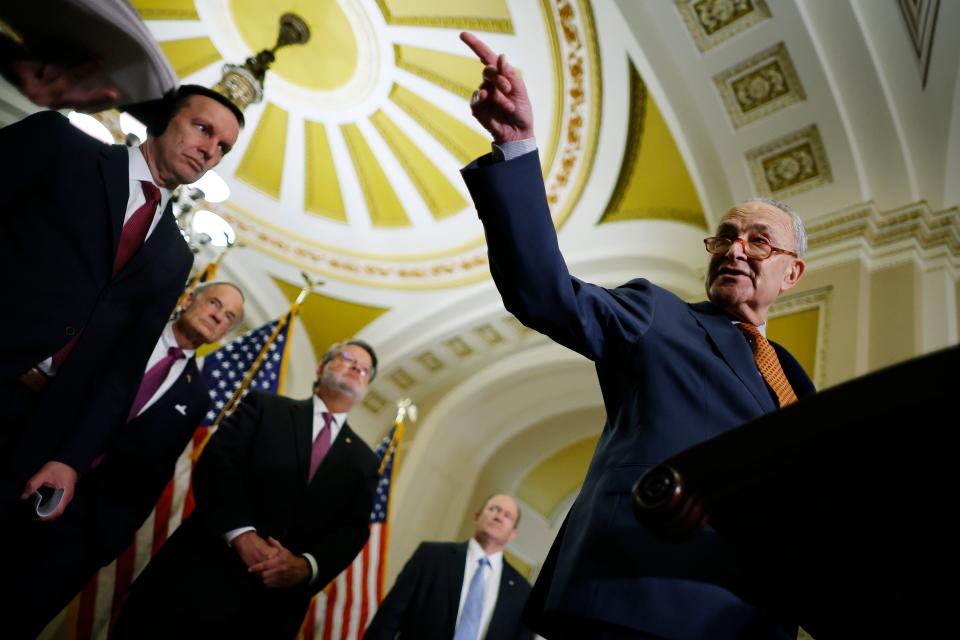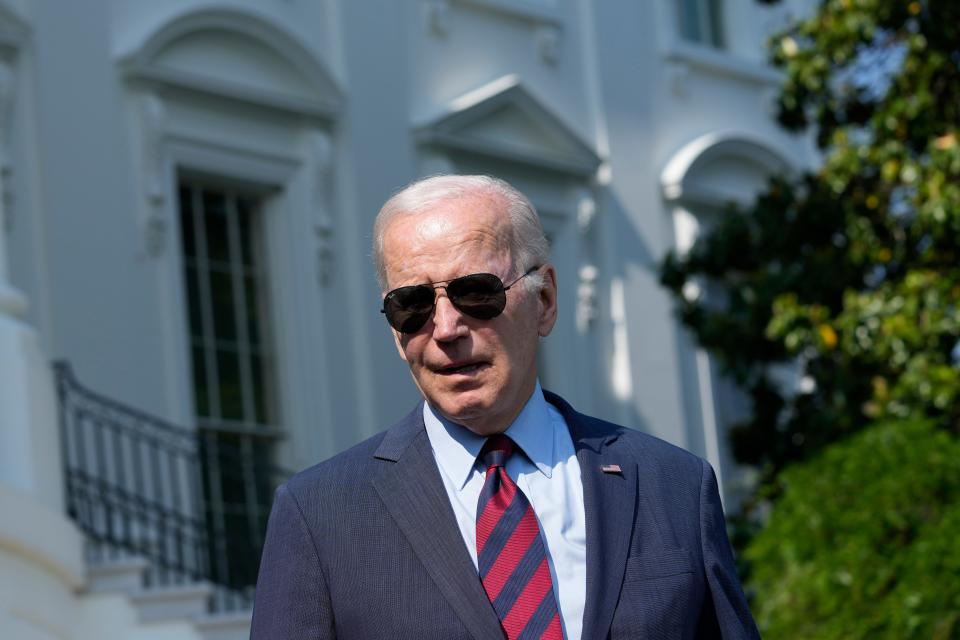'We are not defaulting': 5 takeaways on the debt ceiling votes in House, Senate and spending fight
- Oops!Something went wrong.Please try again later.
- Oops!Something went wrong.Please try again later.
- Oops!Something went wrong.Please try again later.
- Oops!Something went wrong.Please try again later.
- Oops!Something went wrong.Please try again later.
With the United States closer than ever to running out of money, President Joe Biden and Congress avoided a national default that would have been a self-inflicted economic disaster for the country.
The Senate approved a debt deal negotiated by the White House and House Speaker Kevin McCarthy late Thursday evening by a 63-36 vote after a series of failed amendments, capping off a week that infuriated the base of both parties and underscored Washington's dysfunction.
But in the end, both chambers approved the agreement by wide bipartisan margins and ended one of the more stressful weeks of Biden's presidency.
"No one gets everything they want in a negotiation, but make no mistake: this bipartisan agreement is a big win for our economy and the American people," Biden said in a statement Thursday.

Senate Majority Leader Chuck Schumer, D-N.Y., who was aided by his counterpart, Senate Minority Leader Mitch McConnell, R-Ky., ran a legislative clinic in the final hours of the saga after a series of behind-the-scenes talks on how to get the bill across the finish line.
For most of the day it looked as if the Senate wouldn't take up final passage until Friday, but Schumer boasted how the upper chamber acted swiftly to avoid the country getting an inch closer to default.
"America can breathe a sigh of relief," he said. "For all the ups and downs and twists and turns it took to get here, it is so good for this country that both parties have come together at last to avoid default."
Here are the takeaways from Thursday's Senate debate.
Graham throws down defense gauntlet

For most of Thursday, rank-and-file senators from both parties bucked their leadership and were floating plans that could have derailed the Biden-McCarthy deal by seeking changes.
Among the most serious threats came from Sen. Lindsey Graham, R-S.C., a defense hawk who was furious that the Pentagon budget increased to $886 billion − a roughly 3% increase − next year, arguing it didn't keep pace with inflation.
"To my House colleagues, I can't believe you did this," Graham said. "To the speaker, I know you got a tough job. I like you, but the party of Ronald Reagan is dying."
Who wins under the debt deal?: Everyone, and here's why.
Graham demanded at the very least a commitment from Senate leaders to address his concerns and beef up military spending in future proposals, and by the evening he got those assurances.
Schumer, McConnell unite to get the debt deal done
In a rare moment, Schumer and McConnell, who both endorsed the agreement, issued a joint statement that addressed lawmakers' concerns about supplemental funding.
The 99-page debt agreement holds a threat of automatic, across-the-board spending cuts if Congress doesn't approve a dozen separate spending proposals by Jan 1.
"The leaders will seek and facilitate floor consideration of these bills with the cooperation of senators of both parties," the Schumer-McConnell statement said.
The other objections didn't appear as likely to topple Biden and McCarthy's pact, but Senate leaders felt it was necessary to allow those discussions to let out steam.
"We had a lot of members who had amendment requests," said Sen. John Thune, R-S.D. "We tried to accommodate them. I think anybody who wanted to get an amendment voted on is going to get it voted on."
Marathon of failed amendments

Any change to the bill would have forced it back to the House and probably delayed its passage until after the June 5 default deadline.
Once Schumer secured an agreement with members to give their amendments oxygen, he ran the Senate like a manufacturing assembly line under a strict timeframe that saw the upper chamber reject 11 amendments.
Each required a 60-vote threshold to pass and started with a proposal by Sen. Rand Paul, R-Ky., who wanted to impose a 5% cut to all spending over the next two years. That idea was rejected by a 75-21 vote.
After that, the discussions were limited to 10 minutes, and most of those proposed amendments fell by similar margins.
“I want to remind members we were indulgent in the first vote. That's over," Schumer said. "We're doing 10-minute votes. Please stay in your seats so we can finish this bill in a reasonable hour."
In total, 10 amendments were brought by Republicans and one by a Democratic member seeking various changes to the deal, but Schumer made clear earlier this week that any alterations would have sent the measure back to the House and throttled the country into default.
Bipartisan across the board, but McConnell couldn't deliver GOP majority
There was plenty in the bill that Republicans and Democrats didn't like.
Conservatives members wanted deeper cuts and said slashing federal spending by $1.5 trillion over a decade didn't do enough to reduce the country's debt.
Liberals accused the GOP of "hostage-taking" and objected expanding work requirements for food stamps, expediting permitting for oil and gas projects and capping future spending.
But the biggest difference is that McConnell − unlike McCarthy − was't able to get a majority of his caucus to join him in supporting the plan.
Just 16 out of 48 Senate Republicans joined Democrats in supporting the deal. That is in sharp contrast to the 149 out of 222 Republican House members who backed the plan earlier this week.
Biden plans to address the country as government shutdown fight looms

The deal now heads to Biden's desk, where he is certain to sign it after getting a nasty dish off his plate as he pivots to his reelection campaign message.
Biden thanked the Senate leadership and boasted how the plan protects "core pillars" of his agenda, such as protecting Social Security, Medicare and Medicaid; rebuilding U.S. infrastructure; advancing clean energy; and safeguarding health care.
"Our work is far from finished, but this agreement is a critical step forward, and a reminder of what’s possible when we act in the best interests of our country," he said.
"I look forward to signing this bill into law as soon as possible and addressing the American people directly (Friday)."
The White House said the president will address the nation at 7 p.m. EDT Friday.
Importantly, the deal suspends the limit on how much the federal government can borrow until January 2025, which means the country won't be subjected to a debt limit fight again until after next year's presidential contest.
But the road ahead will still be a difficult one for the president and Congress, who must now agree on how to apply the spending limits included in the deal.
McCarthy, emboldened by the debt deal, has already telegraphed that the Republican-controlled House will be looking for ways to cut spending further. And Biden, after irking progressives with certain concessions, may be inclined to dig his heels in deeper amid the 2024 campaign.
This article originally appeared on USA TODAY: U.S. avoids default after Senate vote on debt ceiling: 5 takeaways.

